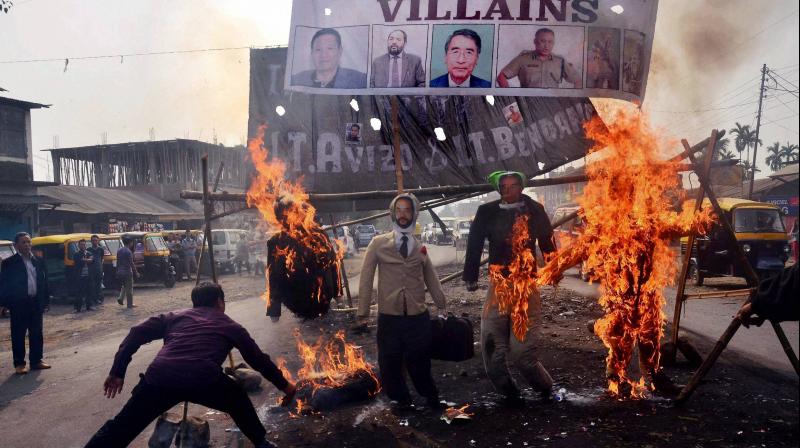It's a one-item menu in restless Nagaland now
Across our states, we find examples of rights being ignored, mocked or just plain denied.

After the bandh imposed by the Nagaland Tribes Action Committee and Joint Co-ordination Committee on January 28 was relaxed on February 3, life appears to be normal in Nagaland. But the bandh still applies to Government offices and the movement of Government vehicles.
Despite the let up, though, tension is thick in the air, rumours are rife, and the average person is apprehensive of what will happen next. But a fortnight after the state was plunged into turmoil, what is significant is that the original cause of it has receded and all the attention is on the stand-off between the Government and the JCC-NTAC.
Read: Pink booths, teddy bears
Local newspapers are full of claims and counter claims by the Government and the JCC-NTAC, and various tribal bodies, political parties and individuals continue to air their views on the stand-off between the Government and the JCC-NTAC.
It was the opposition of the tribal bodies to 33 per cent reservation for women in Urban Local Bodies (ULBs) that kick-started the agitation but today, the hot topic of the day is whether Nagaland’s Chief Minister T.R. Zeliang will resign, as demanded by the NTAC.
The JCC-NTAC has already announced an indefinite bandh from February 13, which will impact rail and air services. The Government, totally paralysed for over a fortnight, has only reiterated its commitment to dialogue till the time of writing. And people are stocking up on food and other essential commodities.
The tribal bodies’ focus has shifted from stiff opposition to women’s reservation in ULBs, to tax and land ownership issues contained in the Nagaland Municipal (Third Amendment) Act, 2016. And after the death of two young men at Dimapur on January 31, the JCC-NTAC’s focus has centred entirely on the Chief Minister’s resignation. The suspicion that political rivalries and machinations are driving the agitation is probably well founded.
But the women’s reservation issue has been relegated to the back-burner as if to suggest that the matter has been settled — Part-IX of the Constitution or no Part-IX of the Constitution — because of Article 371 (A), which protects Naga culture, customs and traditions, and all Naga traditional systems and structures thereof, which are all for and about men.
Read: Go ahead EC, pink rules!
It is adding insult to injury for Naga women that the women’s reservation issue has been once again used, misused and abused in order to centre-stage Naga men’s rights, wishes and wants.
Naga men obviously believe their political rights are divinely sanctioned hence their rights, wishes and wants take precedence over women’s rights. Worse still, they believe that Naga women can enjoy only those rights sanctioned by Naga culture, customs and traditions, all of them, needless to say, authored by men.
The very argument that women’s reservation infringes on Article 371 (A) and Naga culture, traditions and customs, and that Part IX of the Constitution is not applicable to Nagaland because of Article 371 (A), points to the belief among Naga men that Article 371 (A) sanctions only males to be the custodians and interpreters of Naga culture because they have done so for centuries.
Article 371 (A) actually validates this contention of Naga men as it was hastily framed, without in-depth knowledge of the content of Naga customs, and because of the political compulsions of the time.
This underscores why the ball is in the Centre’s court to resolve the current critical situation in Nagaland.
Read: Hey, shame on you man!
Women’s reservation in ULBs was first enacted in the Nagaland Municipal (First Amendment) Act, 2006, but because of the vehement opposition from tribal bodies, no ULB polls were held. The Government did not seriously address the issue or open a dialogue with the tribal bodies for over 10 years. All this has now spilled over to other issues, aggravating the situation in Nagaland, which the all-male Government and tribal bodies are clearly unable to resolve. Worse still, the other issues have eclipsed the crucial issue of Naga women’s right to participate in constitutional decision-making bodies and processes. This underlines the fact that leaving leadership and decision-making to only one section of society, or one sex, impedes inclusive nation-building.
The writer, a journalist and poet, is the editor of Nagaland Pag

